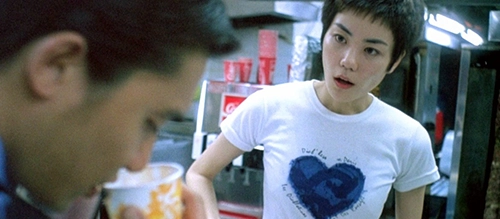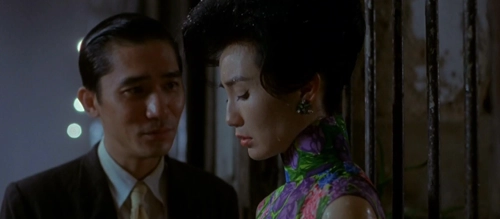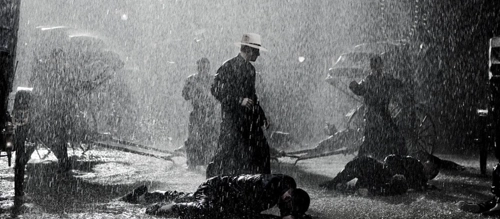Where to Start with Wong Kar-Wai
Born in 1958 in mainland China, beginning as a screenwriter for television and breaking through in a major way as a film director both in his new home of Hong Kong and internationally in the early 1990s, vivid auteur Wong Kar-Wai is one of the most instantly recognisable filmmakers to come out of East Asia in the latter half of the 20th century.
Over 35 years, Wong has shown a fascination with themes of time, love and human connection, exploring them with visual pizzazz, temporally-shifting storytelling and fascinatingly complex characters. His love stories sweep you along and pull at your heartstrings, but they are rarely straightforward, My Blueberry Nights being the closest he has ever come to a rom-com and the darker, more contentious tale of romance Happy Together being a rare and therefore provocative East Asian queer relationship film.
Frequently collaborating with charismatic performers like Tony Leung (Ashes of Time, Chungking Express, Happy Together, In the Mood for Love, 2046 and The Grandmaster), Maggie Cheung (Days of Being Wild, Ashes of Time, In the Mood for Love and 2046) and Leslie Cheung (Days of Being Wild, Ashes of Time and Happy Together), and talented craftspeople like his loyal director of photography Christopher Doyle (with whom he has partnered on seven films including Chungking Express and In the Mood for Love), Wong has built many a strong and long-running creative partnership over his career.
Few directors are as inextricably associated with one city, but Wong’s filmography is inseparable from his home of Hong Kong, its ever-moving people and the drastic changes to its political and cultural landscape over the decades. Though he is well-respected as among the greatest filmmakers of his generation worldwide, it is no wonder that the accolades he has received from the Hong Kong Film Awards vastly outnumbers those from other bodies.
With ten films made over four different decades and – for the English-speaking world at least – lots of titles that don’t tell you an awful lot about what you’re about to watch, Wong Kar-Wai can seem like a difficult sell, but he is a filmmaker very easy to fall in love with if you get over that hurdle. Are you a romantic, a thinker, or just someone who appreciates good-looking and aloof people captured beautifully on camera? Wong Kar-Wai is the director for you.
Any of Wong’s films from his first decade in the business would be fine entry points, but a larger spread over multiple decades might be more fruitful, so here is The Film Magazine’s guide on Where to Start with Wong Kar-Wai.
1. Chungking Express (1994)

Two parallel stories are told of melancholic police officers in love with unattainable women in a bustling mid-90s Hong Kong.
Chungking Express was Wong Kar-Wai’s attempt at self-therapy after his draining and not entirely successful experience making Ashes of Time (1994). Making a smaller, looser and more personal story was just the thing he needed to refocus and find his footing again.
People in Wong’s movies are a dramatic lot. Cop 223 (Takeshi Kaneshiro) is still reeling from a recent breakup. He processes his pain by running to sweat out all his tears and by buying and eating a tin of pineapple due to expire on the one month anniversary of his heartbreak, becoming momentarily distracted by a mysterious drug trafficker (Brigitte Lin) on the run. Cop 663 (Tony Leung) is, on the other hand, in a state of deep depression after his flight attendant girlfriend left him and continues to frequent the snack bar they visited throughout their relationship. The shy Faye (Faye Wong), a new employee at said snack bar, begins to sneak into Cop 663’s apartment and improve his life in small but crucial ways.
This film probably best sums up Wong’s unmistakable and compelling visual style. Wong worked with Australian expatriate cinematographer Christopher Doyle seven times over two decades and it is perhaps this film that best showcases their aesthetic. The dynamic, hypnotic cinematography that blurs people, light and their environment together stands in for the sensory overload of life in a city that never sleeps and for the director’s frequent preoccupation with time misbehaving when we fall in and out of love.
The project began as a scrapbook of ideas for anthology love stories, and those that didn’t make the cut or were prohibitively expensive to film eventually became the basis for the likewise Hong Kong-made Fallen Angels (1995) and Wong’s only English-language (and overall least successful) project to date, My Blueberry Nights (2007).
Martin Scorsese, Quentin Tarantino and James Gunn are considered the kings of movie needle-drops, but Wong Kar-Wai is well-versed in the art as well, at picking just the right track for the moment to intensify emotions. Few who have seen Chungking Express will not be thinking of Faye Wong bopping along at the snack bar whenever “California Dreaming” plays, nor will they be able to get her Cantonese cover version of The Cranberries’ “Dreams” out of their head for a long time.
Wong’s protagonists are complicated creatures, developed over the course of filming and through the on-the-day interactions between scene partners. Cop 223/He Qiwu is probably the most well-developed and also probably the least interesting character here, while we know next to nothing about the Woman in the Blonde Wig but she is still mesmerising. Cop 663 is a sad-sack and Faye is in no uncertain terms a stalker, and yet we are invested in them getting together. Wong has never been one for neat resolutions in his storytelling, working things out on the fly and preferring to leave us and his characters on a hopeful ellipsis, and what a cliffhanger worthy of the soap operas he began his career writing he leaves us with here.
2. In the Mood for Love (2000)

A story about two neighbours in a cramped apartment block in separate unhappy marriages to cheating spouses, meant for each other from first sight but fighting to keep their desires at bay for the sake of propriety.
Unattainable love stories are always the hardest-hitting and In the Mood for Love is truly one of the great bittersweet romances of the modern age.
Wong isn’t out to explain or even rationalise love and the things we do for and because of it, simply stating quite rightly in dialogue that “Feelings can creep up just like that”.
At least one of our protagonists, secretary Mrs Chan (Maggie Chung) or aspiring writer Mr Chow (Tony Leung), are in every scene in the film. The other parties in these marriages, Mr Chan and Mrs Chow, are always kept offscreen. The latter are transitory, unknowable figures only fleetingly heard and more often than not only talked about in their absence by their nosy neighbours and increasingly despairing other halves. This is not their story. We still get a sense of them by the negative space their absence leaves and from the inhabitants of the neighbouring apartments gossiping, and this all adds to the lived-in richness of this film world.
This is a film of little details, from the costume design to physical tics and micro-expressions determinable on the faces of our central pairing, everything matters. As Mrs Chan puts it, “You notice things if you pay attention”. The somewhat rundown apartment block the majority of the film’s scenes take place in and around becomes another living, breathing character in itself.
In the Mood for Love is one of Wong’s less visually flashy films, but it’s a classically handsome one with immaculate cinematography shot through with searing desaturated colours. You could probably write a feature on each scene’s most dominant colour and what it symbolises. You’d have a very strong case to argue that Chung and Leung are the best-looking and sexiest couple in the history of romance cinema, and it’s all done through stolen glances, almost touching, and discussing what might happen between them. It also doesn’t hurt that both look great in early 60s fashion and spend a lot of time brooding in dramatic rainfall.
The film is also a great example of Wong’s preferred loose, semi-improvisational way of crafting a film. The playful manner in which Mrs Chan and Mr Chow imagine and act out how their spouse’s relationship started out, and how they toy with beginning their own extramarital relationship to redress the balance, would work wonderfully on stage and lets both actors show off their considerable range.
Wong clearly did not want to let this particular pair go after a much-truncated 1 hour 40 minutes final runtime, making a sequel half a decade later, 2046, which picked up Mr Chow’s life years later as he processes his regret over letting the love of his life slip away through writing an increasingly convoluted sci-fi story.
3. The Grandmaster (2013)

A heavily fictionalised historical action film inspired by the life of the famed martial artist Ip Man (Tony Leung), telling specifically of his rivalry with the masters of segregated North and South regional styles of kung-fu in China and with particular emphasis on his time as an impoverished teacher in post-war Hong Kong.
Wong Kar-Wai processes the trauma of his country’s past in an incredibly poetic way, the impact of a quote being carried with this portrayal of Ip Man and how his life is upended by the horrors of war: “If life has four sessions, we went from spring straight to winter”.
The Grandmaster is far from perfect, being both more abstract than a lot of martial arts fans might enjoy and so fantastical it makes the already OTT Ip Man series starring Donnie Yen look like a documentary in comparison. But it does show WKW’s range as an artist, even working loosely in a genre he tends to avoid.
This is a high melodrama with dreamlike, balletic fight scenes only one man could capture with such painterly style. Wong began writing and directing romances in order to stand out from his successful countrymen who had, for the most part, made exclusively action cinema. Indifferent though he may have been to the kinds of films people like John Woo had made such massive hits in Hong Kong, Wong shows that between this and Ashes of Time he does have a talent for a certain kind of action film; the most beautiful, evocative action films around.
More important than the floaty, wuxia-inflected fights is the many years-spanning forbidden love affair. Leung’s Ip Man is devoted to his wife and children and is torn from them far before time by foreign occupation and post-war chaos (interestingly the same thing happened to Wong and his brothers, forcibly separated from each other by an ocean when the China/Hong Kong border closed). His real kindred spirit is another formidable martial artist, Gong Ruo Mei (House of Flying Daggers‘ Zhang Ziyi), the daughter of the Northern grandmaster. As stunning as the Ip Man vs Everyone fight in the rain that opens the film is, or Gong’s duel to the death with her father’s murderer veiled in coal smoke from a train is, it’s the playful, poised “precision” fight between two equals, two soulmates, midway through the film that stays with you and makes both characters’ eventual arcs so vivid.
While not as critically acclaimed as Wong’s earlier work in the West, The Grandmaster went on to become his biggest box office hit by some distance and it received a record-breaking 12 prizes at the Hong Kong Film Awards. Even if it cares little for accurately portraying the man who would eventually train Bruce Lee, its spirit and philosophy is one that any devotee of martial arts would appreciate.
Recommended for you: Where to Start with Bong Joon-ho
Fans of romance, existentialism and hypnotic visuals could hardly find a more worthwhile auteur’s career to get stuck into than Wong Kar-Wai’s. If you enjoyed the 3 recommendations above, then Fallen Angels makes for a fine companion piece to Chungking Express, 2046 uses In the Mood for Love as the launch point for a far stranger story, and Happy Together is up there with the master’s very best.

